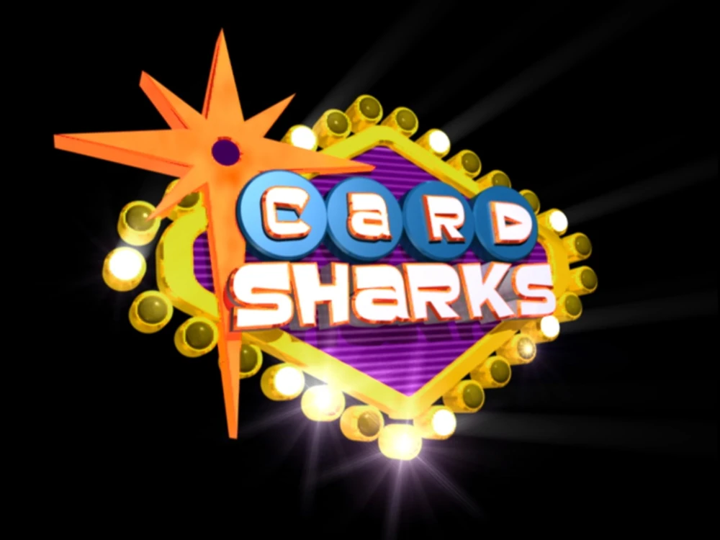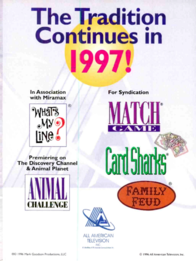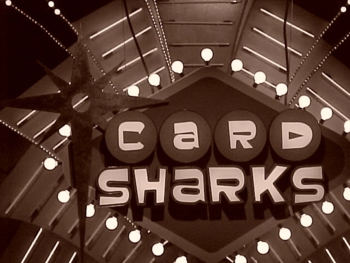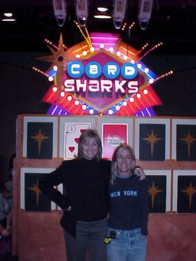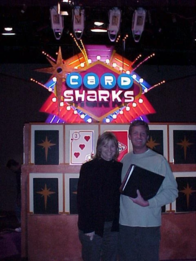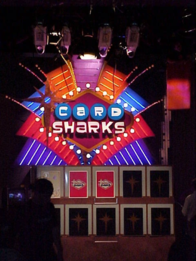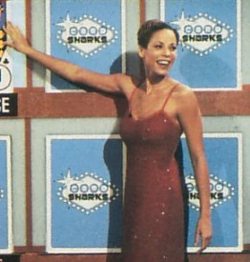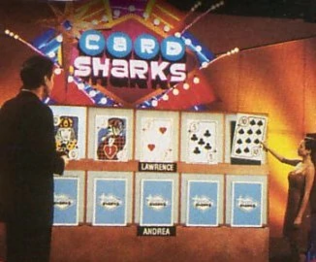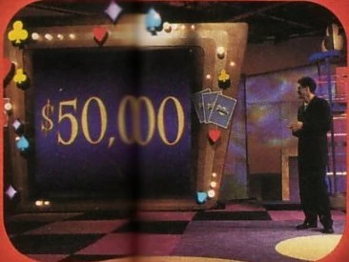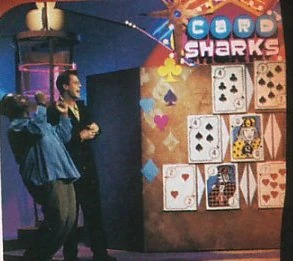Card Sharks (partially lost pilots of syndicated revival of Goodson-Todman game show; 1996-2000)
Card Sharks was a game show created by Mark Goodson and Bill Todman and its format revolves around two contestants deciding how many people responded to a poll question and predicting if their next playing card is higher or lower than the one preceding it. The show first aired on NBC in 1978 and lasted until 1982 with Jim Perry hosting and would have several revivals in the coming decades, with the most recent one airing on ABC from 2019 to 2021 with actor Joel McHale hosting. One of the shortest revivals of the show aired in syndication for four months in 2001 with comedy writer Pat Bullard hosting and was also the most hated, with most reviews of the revival criticizing the revival's format being too different from the prior versions with hidden camera incidents being used instead of poll questions[1]. That revival had been in development since All American Television's acquisition of Mark Goodson Productions in 1996 and several pilots were made to pitch the show.
History
After Mark Goodson Productions was acquired by All American Television in late 1995[2], revivals of Match Game, Card Sharks and the recently cancelled Family Feud were put into development. A pilot for Card Sharks was tapped sometime in mid-1996 with former Sports on Tap host Tom Green as the host and actress Deedee Weathers severing as both dealer and announcer.
1996 Pilot
The format used for the pilot is loosely based on prior versions of the show. The main game consists of two contestants guessing how many of the group of 10 people (with something in common) answered the poll question. The player whose guess is closest to the actual number will go on to play the cards. The player will have to make it through 10 cards by predicting whether the next card is higher or lower than the one preceding it. If they guess wrong, they have to answer another poll question. If the player can make it down the cards, they win a bonus $250 and making down without any mistakes wins them $500. The first player to make it down the cards will go onto the bonus round.
In the bonus round, a special deck consisting only of numbered cards was used. The top four cards were taken from the deck and the Ace of Spades was shuffled in with them. The player would choose four of the five cards to keep, hoping one of them was the Ace. After the four cards were chosen, the player would be shown videos, each featuring one of three celebrities all of whom were asked the same questions. Green would read an answer given by one of the celebrities. A correct choice kept all the cards, an incorrect choice meant they had to give up a card, hopefully not the Ace and would have to try again with the other two celebrities, again losing one of their cards for an incorrect guess.
Development
Despite various delays in production, only Match Game and Family Feud would make it to air before the 1990s ended (with the two premiering in 1998 and 1999 respectively) and Card Sharks would be the only show out of the three to have remain in development hell after the distributor Tribune rejected the pilot[3] and development on any Card Sharks revival would be put on hold when Match Game and Family Feud would start airing and it wouldn't be until after the latter started airing and pulled in good ratings that development on a Card Sharks revival would resume. Some pilots would be tapped in November 2000[4] and the format was given an overhaul from the 1996 pilot.
2000 Pilots
The format of the pilots would be very different from both the series that aired. The first round has two contestants guess the outcome of a hidden camera clip. The player who chose the correct outcome will go on to the cards to play blackjack, but an incorrect choice gives the control of the game over the other player. The chosen player can choose which card they start with, they can either keep or replace the exposed card. After that, the process of guessing the outcome of the hidden camera clip and playing blackjack continues until a player busts or hits 21 and doing that earns the player $200. In the second round, whoever player didn't win the previous round will now select the outcome of another hidden camera clip, a correct choice givens the player control of their own three cards and they must guess if the next card is higher or lower than the one preceding it. Going through the line will win the player $300, but if they make a mistake, the money goes to the other player. This repeats two more times with a card getting added each turn and $100 gets added to the pot. The round ends after a line of five cards are played and $500 gets rewarded. The third round recycles the format from the original version with the player in control again choosing the outcome of another hidden camera clip and the correct choice will give them control of their row of 5 cards and an incorrect choice gives control to the other player. The player in control must predict if the next card is higher or lower than the one preceding it and a mistake will give control of the game to the other player. The first player to complete their row of cards wins a bonus $1,000 and they go onto the money cards.
The money cards are played in the same way as it appears in the aired series. Three rows of cards (three on the bottom row, two in the middle and one on top) were dealt, with the one on the top row called the "Major Wager". The player's winnings is divided on the board for each row. The player starts with $700 and the money can be used to bet if the next card is higher or lower than the one preceding it, a correct guess adds the betted money to the player's bank but an incorrect guess takes away the betted amount from the bank. The contestant has the option to change the first card on each row if they are not satisfied with it. The amount of money the contestant wins is consisted of the money they won in the money cards, if they bust during the money cards, they get $700 as a consolation prize.
Aftermath
While the pilots now differed greatly from the original, they were successful enough to greenlight the show and it started airing on September 17th, 2001 and would air for 65 episodes ending on December 14th with the show's cancellation following not long after[5]. The show would see a revival in 2019 on ABC and fare much better with the critics and fans[6][7] with the original format returning and outliving the previous version and would end in 2021[8] and the 2001 version of the show was quickly forgotten.
Availability
The pilots for the original and 1986 revival can be viewed today, but the pilots from its rocky development prior to its 2001 debut can't. Various mentions of its development (including news articles and trade ads) have been archived and can easily be found today, but the pilots themselves have never been seen publicly. Photos of one of the 2000 pilots were used as promotion for the show's 2001 premiere. On October 1 and November 22, 2018, TV legend Wink Martindale uploaded the 1996 pilot and the first 2000 pilot to his YouTube channel and they can still be viewed today. A sizzle reel of the show included at the end of the upload of the latter includes several clips of the other pilots that were taped in November 2000.
Gallery
Videos
Images
External Links
See Also
Pilots
- Match Game-Hollywood Squares Hour (lost unaired pilot of NBC game show; 1983)
- Showoffs (partially lost unaired pilots of ABC game show; 1975)
- The Price Is Right (partially found unaired pilot for syndicated game show; 1993)
- The New Price Is Right (lost unaired pilot of Goodson-Todman game show; 1972)
- Family Feud (partially found unaired pilot of Pearson game show; 1998-1999)
- Rock Feud (lost unaired pilot of cancelled spin-off of Pearson game show; 2001)
- To Tell The Truth (lost unreleased pilot of Pearson remake of Goodson-Todman panel show; 1999)
Television
- The Price Is Right (partially lost Dennis James episodes of game show; 1972-1977)
- Tattletales (partially found syndicated version of CBS game show; 1977-1978)
- To Tell The Truth (partially found first season of syndicated panel show; 1969-1970)
- The Price Is Right (partially found Australian adaptation of Mark Goodson game show; 1973-1974)
- Snap Judgement (partially found NBC game show; 1967-1969)
- Call My Bluff (partially found NBC game show; 1965)
- Match Game (partially lost Mark Goodson Bill Todman game show; 1973-1982)
- Family Feud - Popular Vs Freaks & Geeks (found episodes of Pearson game show; 2000)
- Family Fortunes (partially lost British version of Goodson-Todman game show; 1980-2002)
- The Price Is Right (partially found Doug Davidson version of Goodson-Todman game show; 1994-1995)
- Match Game (found ABC revival of Goodson-Todman game show; 1990-1991)
- Champion Blockbusters (partially found spin-off of British game show, 1987-1990)
- Släktslaget (lost Swedish adaptation of "Family Feud" game show; 2000)
- Password Plus (found unaired George Peppard episode of Goodson-Todman game show; 1979)
- The Price Is Right (partially lost episodes of CBS game show; 1972-2007)
- Distraction (partially found American adaptation of British game show; 2005-2006)
- I've Got A Secret (partially lost syndicated revival of Goodson-Todman panel show; 1972-1973)
- Press Your Luck (lost British adaptation of American game show; 1991-1992)
- Match Game (partially found revival of Goodson-Todman game show; 1998-1999)
- Showoffs (partially found Goodson-Todman game show; 1975)
- Password (partially found ABC revival of Goodson-Todman game show; 1971-1975)
- Mindreaders (partially found Goodson-Todman game show; 1979-1980)
- Sale Of The Century (partially found Reg Grundy revival of Al Howard game show; 1983-1989)
Miscellaneous
- Super Password (lost builds of unreleased NES port of word game; 1980s)
- To Tell the Truth (lost unreleased DVD game based on panel show; 2005)
References
- ↑ http://gameshowgarbage.com/ind024_cs2001.html
- ↑ https://variety.com/1995/tv/features/all-american-interpublic-in-buying-game-on-goodson-99128770/
- ↑ https://variety.com/1996/scene/vpage/all-american-mulling-a-new-feud-1117466088/
- ↑ https://web.archive.org/web/20011016083029/http://www.krinklecommunications.com/main/CS2001.html
- ↑ https://nexttv.com/news/card-sharks-folds-its-hand-90586
- ↑ https://buzzerblog.com/review/card-sharks-2019/
- ↑ https://tvline.com/2019/06/12/card-sharks-revival-review-abc/
- ↑ https://variety.com/2022/tv/news/alec-baldwin-match-game-canceled-abc-card-sharks-1235221591/
